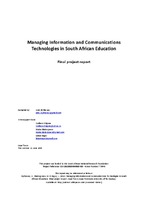Managing information and communications technologies in South African education: final project report

View/
Date
2015-06-11Author
Bytheway, Andrew J.
Bladergroen, M.
Bangui, L.
Metadata
Show full item recordAbstract
This was a meta-study. That means that the intention of the study was to review and analyse previous studies, and draw conclusions about the state of research into technologies in education, and specifically into the management of those technologies.
The project proposed a range of objectives that were reduced because of funding limitations - the reduced project scope focused on an extensive literature review (the bibliography) and the development of a reference model that is intended to guide those concerned with managing ICTs in South African education (whether as managers or as researchers). The original proposal also included the development of case studies and the establishment of a knowledge base (built around the reference model) but this work remains to be done.
The project was somewhat problematic in execution. Resourcing and administrative difficulties resulted in no students graduating (yet), and this is a matter for disappointment. These problems were reported to the NRF and – in the end – useful outputs were achieved.
First, following establishment of the project, a two-day meeting of about 20 experts revealed a consensus: that the many differences that are to be seen (in learners, teachers, resource levels and other factors) are probably the most important thing to acknowledge and respond to, in undertaking further research into technology in South African education and in improving management practice. The drivers for change arising from technological innovation are forceful, and the form and function of education establishments is changing. In the simplest possible view, information technology is an investment and it needs to be managed accordingly.
The idea of value can be used to develop logical connections between the sometimes-uncontrolled cost of education information technologies, and the strategic benefits that are sought for learners and for the nation. Critical to understanding how value can be assured is to acknowledge and pro-actively manage the information systems that are the means to improve educational processes, and the benefits that must be defined and then delivered, if the investment of time, money and effort is to be worthwhile.
The bibliography that emerged from the literature review (more than 160 papers were read, being chosen from more than 700 candidates) confirms that there is little evidence that the management of IT investments in education is researched. Further, while some reported work makes passing reference to (or implies) strategic management, there is little evidence that strategic options and strategic management techniques are being seriously researched at the regional or national level.
To deal with the problems of technology and strategy management:
• The diversity that we live with needs to be understood and incorporated into policies and strategies for information technology and information systems in education.
• The role of the stakeholder, and existing techniques for stakeholder analysis, will be key in determining the value is sought from our information technology investments in education.
• There is more to this than just teaching and learning. Research is a key feature of the education landscape and needs good information technology support; administration at all levels needs good systems, and management needs management information that provides a basis for good decision making.
The reference model, currently focused on "Teaching and Learning" as the core educational activity, organises the chain of value that begins to ensure successful investment. It also shows how knowledge management fits into the "big picture" and it provides an ontological foundation for further work, as well as a framework for the evaluation of performance and value delivery within working education institutions.
The project also developed significant ancillary outputs: a proposal for a special issue of a journal, a "Flash MOOC", and a qualitative research data analyser. The project contributed to a new book, "Investing in Information", that is to be published imminently by Springer in Geneva (and that provides much more detail about the idea of value management from information technology investments). A number of journal papers have already been published, and further papers are in process.
